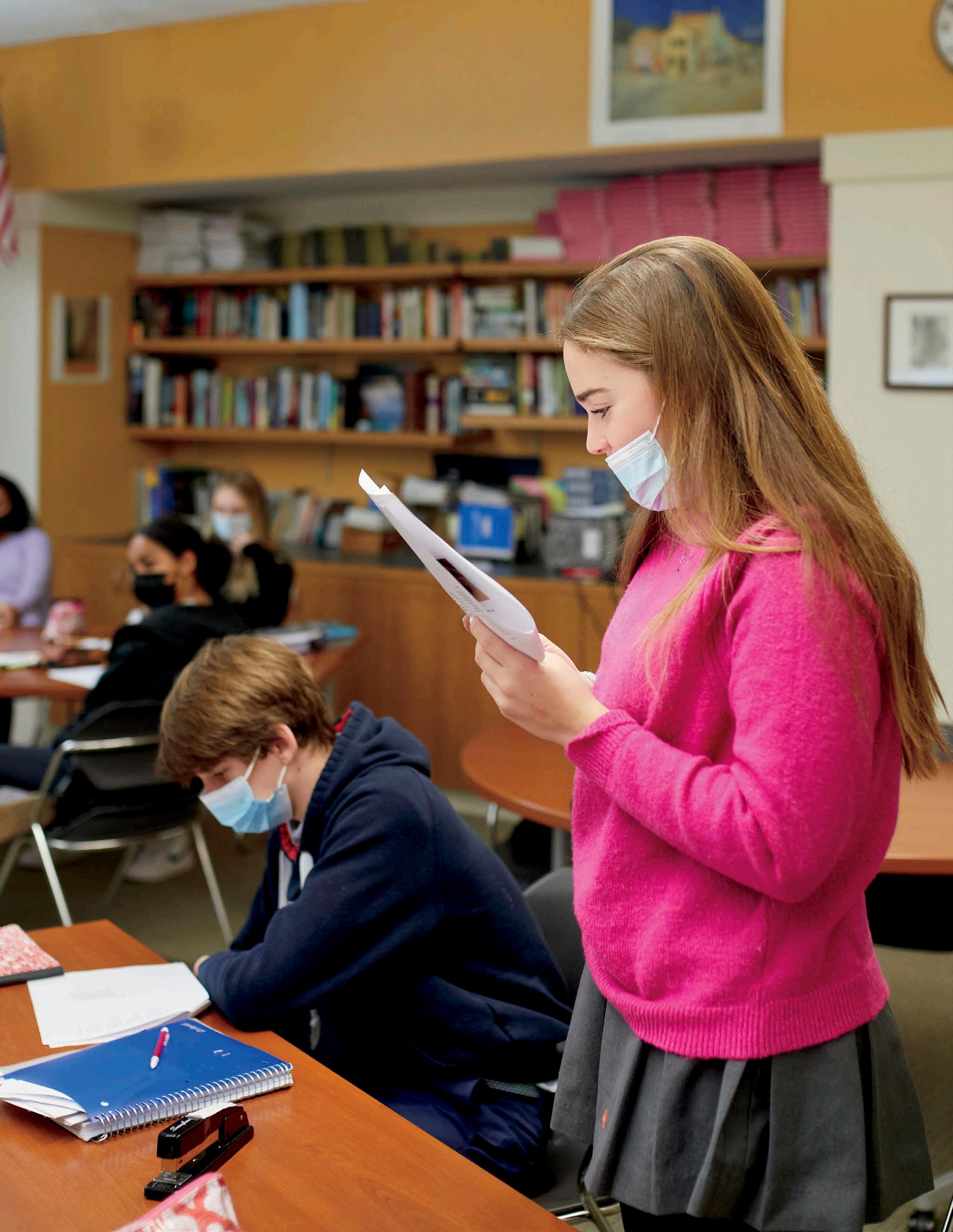
4 minute read
VOICE VOICE THE POWER OF IN MIDDLE SCHOOL
On a wintry Friday morning in late January, eighth-grade students and teachers filed into the Performing Arts Center while the rest of the Middle School classrooms logged on to Zoom to be there virtually. As it neared 8 a.m., a hush took over the entire division as Cooper Taylor made his way onto the stage for the week’s Tiger Talk.
For the next several minutes, the audience sat utterly captivated by Cooper’s calm and detailed retelling of accidentally catching on fire in seventh grade, his path to recovery, and what he learned during this harrowing experience.
A relatively new tradition, Tiger Talks have become a rite of passage in the eighth grade. Budding orators explore personal stories and experiences that reflect their values. Using what they have learned about the writing process, every eighth grader crafts a speech and shares compelling tales and youthful wisdom with classmates. After evaluating the message and presentation, teachers ask a group of students to share their speeches with the entire division.
“This ritual’s vibrant energy is quite an exceptional experience for everyone involved. Student voices infuse deeper meaning into what we hold dear—Tiger Pride,” says Michael McGovern, Chair of the Middle School English Department.
“In eighth grade, we dig deeper into the characteristics of Tiger Pride as well as the impact they have on the individual and the larger community.”
“Writing this speech helped me to think deeply about what happened,” said Cooper after delivering his talk, which included themes of bravery, gratitude, resilience, and perspective-taking. “I really wanted to make it meaningful and to share something important, for people to take a message away from it.”
This is precisely what a Tiger Talk is meant to accomplish, says Mr. McGovern.
“We teach students the skills to explore significant moments and capture an authentic audience. Once you get past the typical adolescent eye-rolling, they begin to understand that they can make the world a better place through the power of their words. It gives them a sense of efficacy and agency,” says Mr. McGovern.
Middle School is a pivotal time for students developmentally, especially regarding their identity. “Before adolescence, a child often feels defined by others. They’ve been told who and what they are. During adolescence, they are trying to figure out who they are in the context of a community and a society,” says Mr. McGovern.
Like all units of study in Middle School English classrooms, the Tiger Talk unit is the culmination and celebration of intensive reading and writing. Students read,
For almost 100 years, GCDS students have been distinguished by their communication skills. Beginning in Nursery and through Upper School, students are given regular opportunities to stand up in front of their classmates and teachers and share their ideas, reflections, or prepared speeches. With the support and guidance of expert teachers, students learn to develop and use their unique voices. Time and time again, alumni have returned to GCDS telling us that the communication and public speaking skills that they developed at GCDS have helped them to progress in their careers and to advocate for the causes in which they believe.
“When students leave Middle School, we want them to have a clear, authentic voice as they transition to Upper School, not just in English class, but across the curriculum. They should feel that being readers, writers, orators, and deep thinkers are significant parts of their identity.”
Harkness Discussions Promote Civil Discourse

In Middle School, strong communication skills begin when students learn and think together through studentled discussions inspired by the Harkness method, a practice of sophisticated and high-level skills in collaboration promoting civil discourse. Student-led dialogue encourages an open exchange of ideas among students while the teacher keeps track of behavior, participation, and the quality of the work. Harkness is not a competition to see who talks the most, and it is not a debate. An effective participant listens and keeps track of their thinking just as much as they speak.
“This is a challenging concept to grasp at this age and to be honest, students need lots of practice. They’re ter- analyze, and discuss mentor texts. They immerse themselves in the writing process by planning, organizing, drafting, revising, and editing multiple pieces. Throughout this process they receive feedback from faculty and peer responders. They practice to be effective. They craft to engage. rible at it at first,” says Mr. McGovern. “It requires that you treat one another’s ideas with dignity and not always think about being right or wrong. It’s about creating a space where ideas can be explored and exchanged with respect. It’s about creating a space where ideas can evolve.”
“When students leave Middle School, we want them to have a clear, authentic voice as they transition to Upper School, not just in English class, but across the curriculum. They should feel that being readers, writers, orators, and deep thinkers are significant parts of their identity,” says Mr. McGovern.
Students begin to lean into this type of discussion in both sixth and seventh
Harkness Guidelines
1
Everyone participates in a meaningful way and, more or less, equally.
2 grade. By eighth grade, even skeptical students see how the idea of civil discourse is an effective mode to help progress their understanding—whether the topic is the motivation of a fictional character or a political leader.
Balance and order prevail; focus is on one speaker and one idea at a time.
“It’s as much about how they treat one another as it is about the actual content,” says Mr. McGovern.
3
As discussion builds, there is an attempt to resolve all questions before moving on.
Big ideas and deep insights are developed.
4
Students support their arguments with examples and quotations throughout the discussion.
5
Students listen respectfully to one another—no one talks, daydreams, rustles papers, makes faces, or uses laptops when someone else is speaking as this communicates disrespect and undermines the discussion.

The Scholastic Art & Writing Awards, established in 1923, is the nation’s longest-running and most prestigious scholarship and recognition program for young artists and writers in grades 7–12. Congratulations to the 2021 GCDS award recipients.




Steele Barhydt, Grade 8
Category: Novel Writing
Excerpt: “The Dirt Path from Hell”
Award: Silver Key
Cooper Taylor, Grade 8
Category: Personal Essay & Memoir
“The Fire”
Award: Silver Key
Annie Noble, Grade 7
Category: Short Story
“The Tunnel to My Past”
Award: Honorable Mention
Riley Hart, Grade 8
Category: Short Story
“Modern Gladiators”
Award: Honorable Mention
Francesca Loverro, Grade 10
Category: Critical Essay
“The Remedy of Respect”
Award: Honorable Mention










